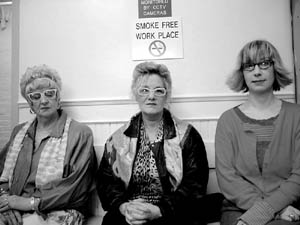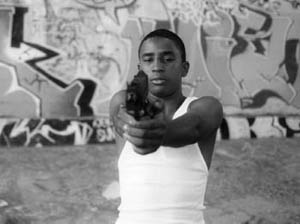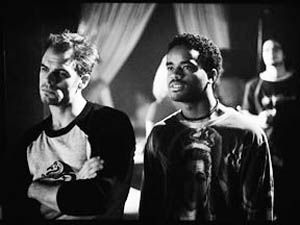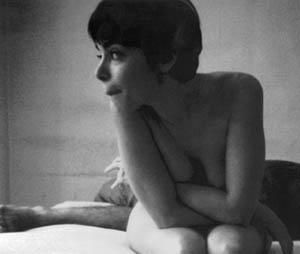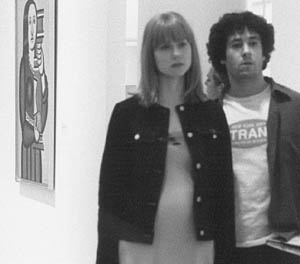![[Metroactive Movies]](/movies/gifs/movies468.gif)
[ Movies Index | Show Times | San Jose | Metroactive Central | Archives ]
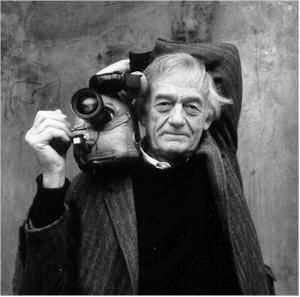 Boundary Pusher: The old-style documentary was never the same after Richard Leacock got a hold of it. Direct Cinema Cinequest Maverick Spirit Award winner Richard Leacock pioneered the modern documentary THE OLD-STYLE documentary that most people over 30 remember featured an organ-voiced narrator. Behind him--and it was always a "him"--was a classical-music track (for impressive subjects like icebergs calving or missile launching) or some sub-Leroy Anderson whimsical music (for the lighter stuff like trout fishing or soapbox derbies). Both the music and the narration let you know exactly what you were seeing and how to understand it. Some nonfiction filmmakers--Pare Lorentz and Robert Flaherty, for example--could make memorable films despite these Olympian POVs. Yet even the best of these early documentaries, as film historian David Thomson writes, were "made [with] institutional or corporate money, to propound some notion about how the world ought to be run, or rerun." Maybe it was presumptuous loftiness that made the documentary film such a roundly disliked medium. Richard Leacock, one of the directors who made the old-style documentary obsolete, will make a guest appearance at this year's Cinequest. (He appears March 1 at 7pm at the weekly cine16 screening; March 2 at 5:15pm at Camera 3 as part of the DXD session; and at 9pm at Camera 3 to accept a Maverick Spirit Award.) Leacock's previous films aren't famous outside the film buff world, but his Direct Cinema movement played a key part in changing the way documentaries have been made ever since. Leacock will bring with him one of his newest works (done on 8mm tape): A Musical Adventure in Siberia (1996) about the preparation of a performance by Sara Caldwell and the Ekatarinsburg Symphony of Prokofiev's symphonic drama Eugene Onegin, a piece banned by Stalin in 1937 and not publicly performed there since. Local nonfiction film expert Geoff Alexander's cine16 webpage (www.cine16.com) offers a marvelous rundown on Leacock's films, including several essays and notes by the filmmaker. Here's the short version. An immigrant to America, Leacock took a degree in physics at Harvard and then became a war photographer, mostly for director Willard Van Dyke. After V-J Day, Leacock returned to work on Robert Flaherty's 1948 Louisiana Story, collaborating with various other filmmakers before joining Robert Drew Associates in 1958. Leacock begin to develop what he called the Direct Cinema movement, bringing in lightweight cameras, sound equipment and a lack of editorializing to a variety of different subjects. In his career, Leacock has photographed the likes of Hemingway, Norman Mailer, John F. Kennedy and Louise Brooks. Leacock's partners and co-workers have included D.A. Pennebaker (Don't Look Back, The War Room), the Maysles brothers (Gimme Shelter) and Ridley Scott (Hannibal). After heading the film department at MIT, Leacock retired from teaching to France, where he lives today with his partner and fellow filmmaker Valerie Lalonde. This man of such free-ranging work didn't have a manifesto to speak of. When Leacock describes what he saw as his role as a filmmaker, it boils down to his attempt to recreate the experience of "being there"--with the technological help of the best and most portable cameras. Leacock was an early and enthusiastic patron of 8mm video: "As far as actual shooting and editing goes," he notes in an essay, "I adore this new way. I would never go back to film. The camera is a gem; with a really good microphone attached [it will cost about as much as the camera], you can obtain superb sound, far better than the dreadful optical tracks on 16mm prints. The new image-stabilizing device in the camera is astoundingly effective." Leacock's pioneering efforts to bring the camera into intimate quarters have come with a price. As a physics student, surely Leacock knows the scientific question of whether or not observation changes phenomena. Leacock's lived long enough to see his fast, unobtrusive technique become a part of the everyday scene. But who hasn't feared the way the portable camera has coarsened life and politics, or dreaded TV crews as if they were vampires seeking blood? David Thomson comments: "Cinema verité has tended to founder on the everyday and mundane. Secretly, it has the journalist's uneasy lust for disaster or breakdown, for the moment when the subject 'cracks.'" Who would describe the pornographic collisions and industrial accidents on Real TV as "uneasy"? Maybe what cheapens tabloid TV the most is the context in which real-life tragedy is placed. On Fox Television, as in days of old, there's always a narrator sternly informing us that this is the cost of defying the police (or twisters or animals that attack or disaffected workers spitting into the soup). Thus even spectacular footage is degraded to the level of a 16mm snoozer on Trout Fishing in Alberta. Leacock's lack of commentary--leaving the judgment to the viewer--is a lesson that hasn't been learned nearly enough--even though his sensibility as a director has spread from television to the Internet and beyond.
Name Game: Cinequest comes loaded with some high-powered behind-the-lens stars Cineful Delight: More reviews of this year's Cinequest films.
Festival at a Glance
Death to Life
Critics commonly describe movies as "wake-up calls." This powerful short film by Mountain View's Pam Walton (Call to Witness, Cinequest 2000) really is one. In 27 minutes, Walton chronicles the last two years of life for her friend Joyce Fulton, who succumbed to a brain tumor in November 1999. Walton's twist on the subject is showing Fulton's last days first, when the woman is so shockingly ill that she can barely speak or breathe. Then the director turns the episodes backward chronologically so that Fulton emerges in gradually better health--and the viewer can get an idea of what he or she missed by never knowing Fulton, a teacher and activist who was named Woman of the Year in 1994 by the California State Legislature. Death to Life is a memoir of a strong woman who--from the look of the crowd at the head-shaving party she had before surgery--could count on dozens of friends. And Death to Life is a sobering look at the round of hospitals, doctors and waiting games most of us are going to face on our way out of this life. Treasure your health while you have it. (RvB) (Shows at Cinequest at the Bay Area Shorts Showcase, Feb 25, noon; Feb 28, 9:45 pm)
Bingo Robbers
This Canadian import twists a buddy/road movie into a dysfunctional drive around town. Co-writers, co-directors and co-stars Lois Brown and Barry Newhook play Nancy and Vallis, the titular thieves, or would-be thieves, who plan to steal the jackpot from the local bingo hall. Such a theft would be the pinnacle of achievement for the duo, since Nancy and Vallis' frequent arguments have led to them bungling every robbery they've tried to pull off; instead they live off cash borrowed from Vallis' mother and spend the bulk of their time bickering and tooling around in Vallis' car. Naturally, Nancy and Vallis are at least as inept at their emotional lives as they are at thievery; not only is their own relationship becoming murkily more romantic, Vallis is stalking an old girlfriend and Nancy allows her ex-husband, Jack, to constantly leech off her. If Nancy and Vallis can't define their relationship, Brown and Newhook, as writers or actors, don't go much farther--these characters discuss their feelings endlessly, but there's not a lot of evidence that they actually feel more than self-pity. The Bingo Robbers is notable for being one of the first digital films shot in Newfoundland, and Brown and Newhook have made eye-catching use of the medium. In particular, a number of slick stop-motion shots of Vallis' car on the road add a sense of motion and break up the more static scenes of introspective discussion. However, the same device also provides a sense of momentum that isn't supported by the story or characters; the whole world seems adrift around these drifters--nothing is moving in this small, insular world. (HZ) (March 2 at 7:30pm at Camera One and March 3 at 4:45pm at Camera 3.)
Gang Tapes
The world needs another 'hood movie like it needs another reality TV show. Shot on digital video, Adam Ripp's directorial debut is seen through the eyes of a 13-year-old Compton kid (Trivell) who steals a camcorder and proceeds to videotape every single pivotal moment in his life as a newly initiated gangbanger, from his first sexual experience to his first killing. The Blair Witch-inspired verité gimmick can't disguise the fact that Gang Tapes doesn't really add anything new to the cautionary 'hood genre. The same clichés cleverly mocked by the Wayans brothers' Don't Be a Menace to South Central are all here. Only the scenes between the kid and his compassionate single mother are done with any originality; she has to be the first mother in a 'hood movie who talks to her son like an equal. Unlike the misogynist Boyz N the Hood, Gang Tapes doesn't pin the blame on the mama for her son's path into thug life. Some will argue that Ripp, a white director, has no business making a movie about South Central--and there might be some merit in that argument--but Gang Tapes isn't really as distorted as say, Dennis Hopper's Colors. Its biggest crime is that it's formulaic. (JA) (March 2 at 9:30pm at Camera One and March 3 at 6:45pm at Camera 3.)
Breakin' the Glass
Marla Leech and Dina Maria Munsch's documentary chronicles the rise and fall of the American Basketball League (ABL) in San Jose circa 1996-1998. The well-researched production features on-camera commentary from members of the now-defunct San Jose Lasers, the team's coach Angela Beck and other key figures in women's basketball. The informative film, buoyed by the force behind the 1972 Title IX amendment, addresses the struggles that female athletes continue to face to be taken seriously in the male-dominated sports arena, and shows how the ABL was gaining serious ground before the Women's National Basketball Association (WNBA), spearheaded by NBA commissioner David Stern, took over (many ABL players refused to join the WNBA as a matter of principle). Breakin' the Glass contrasts the two organizations with statistics that suggest that the ABL offered its players far better contracts than the WNBA--though neither compete with the multimillion-dollar salaries and mega-endorsements given to male players in the NBA. This straightforward sports documentary features plenty of hoop action with footage of real games in play. Mostly though, it's a sobering look at the severe gender-related inequalities that still exist in American sports today. (SQ) (Plays as part of the Bay Area Shorts Showcase, Feb. 25 at noon and Feb. 28 at 9:45pm at Camera One.)
Love Come Down
Watching a bad stand-up comedian is one of the most acute forms of torture. It's a double bind. While your humanity reaches out to the performer, you can't respond for fear of encouraging him. The easiest response--complete derision--leaves you feeling cheap and vicious. Love Come Down is about a struggling stand-up comedian. Neville (Larenz Tate) has a list of problems as long as his arm--and that's not even counting the needle Neville used to put into that arm before he went into rehab. He's the son of a mother who killed his abusive father; she's still in jail. He works at a shoe store and hates it; he's feuding with his violent, promiscuous brother Matt (Martin Cummins). He's involved with a troubled young woman named Niko (Deborah Cox) who doesn't want to settle down. Flashbacks to Neville and Matt's troubled childhood reiterate Neville's torment. Fortunately, there's a nun in Neville's corner, giving him spiritual support. (Sarah Polley is "Sister Sarah"--she's never been worse.) Director/writer Clement Virgo deserves credit for resisting the choice of making this tale of a troubled, abused young man into a crime story, but he hasn't woven these various plot threads together. Sticky poetic, sentimental and pious touches gum up the works. It's easy to sympathize with the mean club owner who doesn't feel like giving Neville a gig, when the would-be comedian auditions with confessionals about his family problems. You can also sympathize with Neville's woes and still feel that Love Come Down is often as embarrassing as watching a stand-up comedian self-destruct before a microphone. (RvB) (March 1 at 7:30pm at the Aquarius in Palo Alto; March 3 at 7:15pm at the AMC Saratoga.)
Lovers
Three rules in life, said the novelist Nelson Algren: Never play poker with a man named Doc, never eat at a place called Mom's and never sleep with anyone whose problems are worse than your own. Jeanne (Elodie Bouchez), a Parisian bookstore clerk, breaks that third rule when she picks up Dragan (Sergeï Trifunovic), an artist from Serbia who is living as an illegal alien in France. Actor Jean-Marc Barr filmed this low-fi Dogme '95 offering with compassion and intelligence; Dragan's sometimes irritating and impulsive qualities make sure that this courtship is never too smooth. With her tragic gaze, Bouchez (the grubby angel in The Dream Life of Angels) gives this story much of its sorrow. In the last scene on a staircase--prolonged and yet just right--Bouchez underplays her part like the master actress she is. (RvB) (Feb. 24 at noon at Camera One; Feb. 26 at 1pm and Feb. 27 at 9:30pm at Camera 3.)
Maze
You never know what's enough until you know what's more than enough, wrote William Blake. Similarly you never know what's more than enough until you see an actor turning writer/director/producer, directing himself as he plays a saintly handicapped person. In Maze, Rob Morrow (Quiz Show) plays an artist named Lyle, who is afflicted with Tourette's syndrome and who carries the torch for Callie (Laura Linney), the pregnant girlfriend of his best pal, Mike (Craig Sheffer), who has impulsively headed for Burundi for six months. Maybe Lars von Trier could have taken the bathos out of this plot, but Morrow cuts himself almost Jerry Lewis levels of slacks as he tics and rages, splatters women with wine and paint, and loyally resists the advances of the woman he loves. Linney's prettiness, subtlety and wisdom (seen in You Can Count on Me) defy the pregnancy jokes and the pattest of pat endings. (RvB) (Feb. 24 at 12:45pm at the AMC Saratoga; Feb. 26 at 9:30pm at the Aquarius in Palo Alto; March 1 at 5:30pm and March 3 at 11:30am at the AMC Saratoga.)
Our critics are Jim Aquino (JA), Richard von Busack (RvB) and Heather Zimmerman (HZ). Our star system runs the gamut from one to four big ones. Cinequest runs Feb. 22-March 4 at the Camera Cinemas, Second and San Carlos streets, San Jose; the AMC Saratoga 14, 700 El Paseo de Saratoga; and the Aquarius Theatre, 420 Emerson St., Palo Alto. Full festival passes are $195. The opening-night gala (including a party at Scott's) and the closing-night screening (with a party at A.P. Stump's) are $35 each. Tributes are $10-$25. The DXD seminar's are $20 each. Individual screenings are $7 students and seniors/$8 general. Call 408.295.FEST for ticket information. (Full Disclosure: Metro is one of the executive sponsors of the festival.) [ San Jose | Metroactive Central | Archives ]
|
From the February 22-28, 2001 issue of Metro, Silicon Valley's Weekly Newspaper.
Copyright © 2001 Metro Publishing Inc. Metroactive is affiliated with the Boulevards Network.
For more information about the San Jose/Silicon Valley area, visit sanjose.com.
![[line]](/gifs/line.gif)
